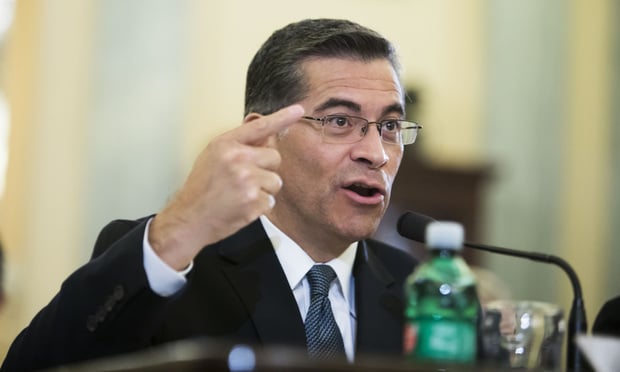Becerra Rips Lawmakers for 'Unworkable' Provisions in New Data Privacy Law
"Failure to cure these identified flaws will undermine California's authority to launch and sustain vigorous oversight and effective enforcement of the CCPA's critical privacy protections," Xavier Becerra told lawmakers in a sharply worded letter.
August 29, 2018 at 04:22 PM
4 minute read
 California Attorney General Xavier Becerra testifies in Washington in September. Credit: Diego M. Radzinschi/ ALM
California Attorney General Xavier Becerra testifies in Washington in September. Credit: Diego M. Radzinschi/ ALM
California Attorney General Xavier Becerra lashed out at lawmakers for imposing “unworkable obligations and serious operational challenges” on his office by effectively making him the chief enforcer of the state's sweeping new data privacy law.
In an Aug. 22 letter to legislators who helped get the law passed in June, Becerra complained that his office is not equipped to handle all the related duties, including quickly drafting regulations and advising businesses about compliance with the California Consumer Privacy Act, or CCPA.
“Failure to cure these identified flaws will undermine California's authority to launch and sustain vigorous oversight and effective enforcement of the CCPA's critical privacy protections,” Becerra wrote in the letter, which was obtained by Eric Goldman, a Santa Clara University law school professor and critic of the new privacy rules.
Becerra also questioned the legality of the civil penalties included in the new law, which he said improperly modified the state's Unfair Competition Law, or UCL.
“The UCL's civil penalty laws were enacted by the voters through Proposition 64 in 2004 and cannot be amended through legislation,” Becerra wrote. The data-privacy law's “constitutional infirmity” can be cured “by simply replacing the CCPA's current penalty provision with a conventional stand-alone enforcement provision” that does not purport to change the Unfair Competition Law.
Becerra's press office declined to comment Wednesday on the letter.
Lawmakers tried to address some of the attorney general's concerns in clean-up legislation that was pending Wednesday in the Assembly. One bill, SB 1121, drops a requirement in the Consumer Privacy Act that consumers must first notify the attorney general's office before suing over a data breach. The pending legislation recasts the civil penalty provisions and delays enforcement of the new law until six months after the attorney general publishes new regulations or July 1, 2020—whichever is sooner.
A separately pending budget bill would also appropriate $700,000 to Becerra's office for help drafting and enforcing the new regulations.
The changes do not, however, include a broader private right of action—sought by the attorney general—that would shift the litigation burden to consumers. Such a provision would have attracted fierce opposition from business groups that oppose any expansion of plaintiffs' ability bring class actions and individual suits.
Becerra's beefs with the Consumer Privacy Act foreshadow the fights that are looming over the state's sweeping digital information law as interests, including those in government, push to alter its reach and enforcement before it goes into effect in 2020. The law was drafted in sometimes-frantic summer negotiations and enacted as an alternative to a broader privacy protection initiative that was ultimately pulled from the November ballot.
Privacy advocates have successfully staved off attempts by critics of the new law to make substantial changes before the legislative session ends Friday. But they know the battles that lie ahead.
“Certainly the privacy groups and assorted consumer groups, we know this is coming,” said Lee Tien, a senior staff attorney for the Electronic Frontier Foundation who worked on the original legislation. Tien said he expects advocates and opponents of the law to meet and negotiate even before the new legislative session starts in January.
The business lobby is already pushing to narrow what they have to disclose to consumers about information that is collected about them. Companies are also lobbying the federal government for industry friendly rules that would preempt California's new law.
“My experience is that stakeholders who have a lot of resources generally do everything at the same time,” Tien said. “They will talk to us in good faith. At the same time they'd be crazy not to be in D.C. seeing if they can get a better deal there. I'm not a Pollyanna.”
Becerra's letter is posted below:
Read more:
What Does the Calif. Consumer Privacy Act Mean for Lawyers?
Behind the Wrangling Over California's Sweeping Consumer Privacy Bill
NOT FOR REPRINT
© 2025 ALM Global, LLC, All Rights Reserved. Request academic re-use from www.copyright.com. All other uses, submit a request to [email protected]. For more information visit Asset & Logo Licensing.
You Might Like
View All
Meta agrees to pay $25 million to settle lawsuit from Trump after Jan. 6 suspension
4 minute read
How We Won It: Latham Secures Back-to-Back ITC Patent Wins for California Companies
6 minute read
Trending Stories
- 1Gunderson Dettmer Opens Atlanta Office With 3 Partners From Morris Manning
- 2Decision of the Day: Court Holds Accident with Post Driver Was 'Bizarre Occurrence,' Dismisses Action Brought Under Labor Law §240
- 3Judge Recommends Disbarment for Attorney Who Plotted to Hack Judge's Email, Phone
- 4Two Wilkinson Stekloff Associates Among Victims of DC Plane Crash
- 5Two More Victims Alleged in New Sean Combs Sex Trafficking Indictment
Who Got The Work
J. Brugh Lower of Gibbons has entered an appearance for industrial equipment supplier Devco Corporation in a pending trademark infringement lawsuit. The suit, accusing the defendant of selling knock-off Graco products, was filed Dec. 18 in New Jersey District Court by Rivkin Radler on behalf of Graco Inc. and Graco Minnesota. The case, assigned to U.S. District Judge Zahid N. Quraishi, is 3:24-cv-11294, Graco Inc. et al v. Devco Corporation.
Who Got The Work
Rebecca Maller-Stein and Kent A. Yalowitz of Arnold & Porter Kaye Scholer have entered their appearances for Hanaco Venture Capital and its executives, Lior Prosor and David Frankel, in a pending securities lawsuit. The action, filed on Dec. 24 in New York Southern District Court by Zell, Aron & Co. on behalf of Goldeneye Advisors, accuses the defendants of negligently and fraudulently managing the plaintiff's $1 million investment. The case, assigned to U.S. District Judge Vernon S. Broderick, is 1:24-cv-09918, Goldeneye Advisors, LLC v. Hanaco Venture Capital, Ltd. et al.
Who Got The Work
Attorneys from A&O Shearman has stepped in as defense counsel for Toronto-Dominion Bank and other defendants in a pending securities class action. The suit, filed Dec. 11 in New York Southern District Court by Bleichmar Fonti & Auld, accuses the defendants of concealing the bank's 'pervasive' deficiencies in regards to its compliance with the Bank Secrecy Act and the quality of its anti-money laundering controls. The case, assigned to U.S. District Judge Arun Subramanian, is 1:24-cv-09445, Gonzalez v. The Toronto-Dominion Bank et al.
Who Got The Work
Crown Castle International, a Pennsylvania company providing shared communications infrastructure, has turned to Luke D. Wolf of Gordon Rees Scully Mansukhani to fend off a pending breach-of-contract lawsuit. The court action, filed Nov. 25 in Michigan Eastern District Court by Hooper Hathaway PC on behalf of The Town Residences LLC, accuses Crown Castle of failing to transfer approximately $30,000 in utility payments from T-Mobile in breach of a roof-top lease and assignment agreement. The case, assigned to U.S. District Judge Susan K. Declercq, is 2:24-cv-13131, The Town Residences LLC v. T-Mobile US, Inc. et al.
Who Got The Work
Wilfred P. Coronato and Daniel M. Schwartz of McCarter & English have stepped in as defense counsel to Electrolux Home Products Inc. in a pending product liability lawsuit. The court action, filed Nov. 26 in New York Eastern District Court by Poulos Lopiccolo PC and Nagel Rice LLP on behalf of David Stern, alleges that the defendant's refrigerators’ drawers and shelving repeatedly break and fall apart within months after purchase. The case, assigned to U.S. District Judge Joan M. Azrack, is 2:24-cv-08204, Stern v. Electrolux Home Products, Inc.
Featured Firms
Law Offices of Gary Martin Hays & Associates, P.C.
(470) 294-1674
Law Offices of Mark E. Salomone
(857) 444-6468
Smith & Hassler
(713) 739-1250







